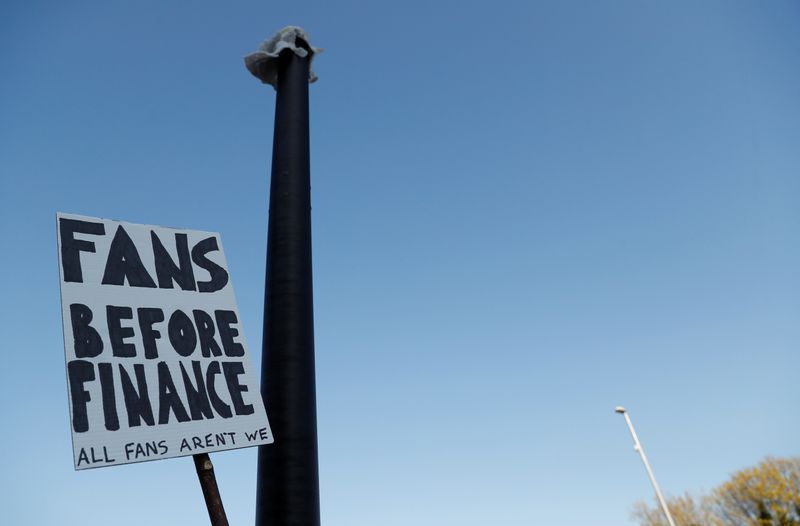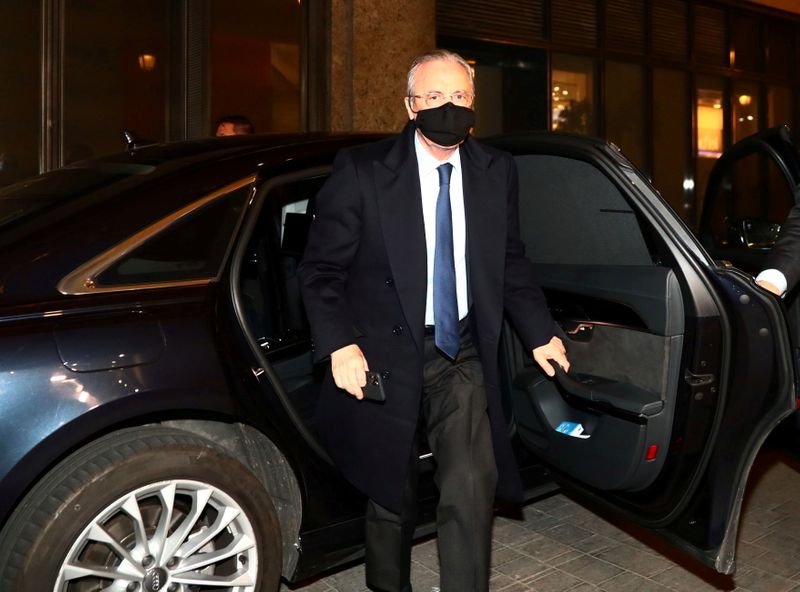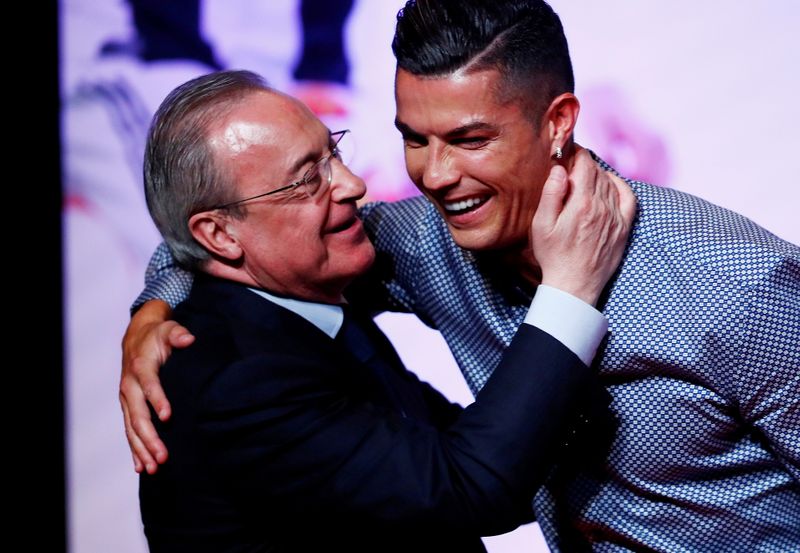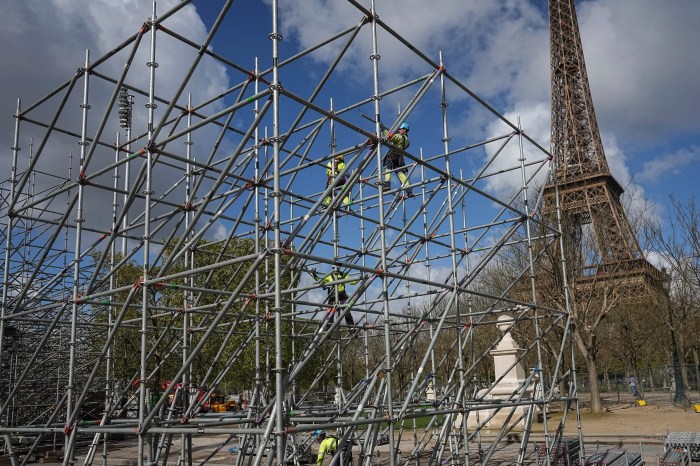MADRID (Reuters) – Florentino Perez is not used to losing, either when signing soccer stars to grace the immaculate turf of Madrid’s Santiago Bernabeu stadium or in pulling off multi-billion dollar deals for his construction empire.
Yet the Real Madrid President’s dream of creating a European Super League (ESL) of top soccer clubs, code-named “The Best Show” by those working on it, unravelled this week within 48 hours of its announcement.
“I am sad and disappointed. We have been working on this project for three years. Last season we (the ESL teams) lost 650 million (euros) and this season two or three times as much,” Perez said during a radio interview on Wednesday.
The defeat represents a rare blow to the 74-year-old’s ambitions which sources said were spurred initially by his concerns about securing the long-term financial future of Real Madrid and the danger it could get left behind by other big-spending clubs.
“I have the responsibility for Real Madrid to be a pioneer. If there is money, there is money for everyone,” Perez told Spanish radio station Cadena Ser.
While some of those involved behind-the-scenes say that the super league may yet be revived in some form, its lengthy gestation was an indication of how hard a deal was to achieve.
Devised in secret amongst club bosses and financiers, the project imploded when it was officially unveiled and faced a ferocious backlash from fans, pundits and politicians.
“The project is like Game of Thrones. It may not be totally over just yet but certainly they will have to revamp it completely,” one source with knowledge of the ESL plan said.
Real Madrid declined to make Perez available for interview. This account of the super league’s beginnings is based on interviews with club officials, bankers and advisors directly involved in negotiations for the project.
The forces which led to the ill-fated birth of the super league, which involved 12 top clubs, were accelerated by the impact of the coronavirus pandemic on the finances of the teams involved, three sources familiar with the matter told Reuters.
While Perez was the “driving force” behind the ESL, a central figure in bringing the 12 clubs together was 37-year-old Anas Laghrari, a partner at Madrid-based advisory firm Key Capital, who the first source said helped mastermind the project from the start and was rewarded with a top ESL job.
“Laghrari spends his life in Florentino Perez’s office and Perez doesn’t do anything without him knowing,” the source said.
Their relationship stems from a previous connection Laghrari’s father had with Perez when the two men were business partners.
Although Perez sketched out an outline for the ESL nearly five years ago, it only really began to get serious and take shape towards the end of 2018, when a protracted takeover battle by his ACS Group for toll road operator Abertis ended.
Key Capital’s CEO Alex Matitia, Laghrari and another partner Borja Prado began working almost exclusively with Perez from early 2019, initially arranging a 575 million euro ($691 million) finance package to revamp the Bernabeu before Laghrari focused entirely on the super league.
Meanwhile Prado, a former Mediobanca banker, advised Perez on all deals involving Italy and is deeply involved in ACS’ current bid for Italian motorway group Autostrade.
Prado is also a partner at private equity fund Peninsula, a long-term investment firm which explored a possible investment in ESL when the project was being drafted, two sources familiar with the matter said.
Laghrari, Matitia and Prado could not be reached for comment when contacted via Key Capital, which confirmed it has been advising Perez on the ESL project. It did not provide further details.
Representatives of Peninsula could not be immediately reached for comment.
But it was JPMorgan, a bank which Perez had been working closely with for years and helped with the funding for the Bernabeu refurbishment, who the Spanish businessman turned to when he needed as much as $5 billion to kick off the ESL.
Perez had met its chief executive Jamie Dimon in Madrid in July 2018, when the two discussed the Bernabeu funding but not the ESL deal, one source told Reuters, further cementing the relationship with the bank, which also helped finance an initial 17.1 billion euro ACS bid for Abertis.
When it came to getting the ESL off the ground, JPMorgan’s senior country officer of Iberia in Madrid, Ignacio de la Colina, was part of a group of bankers across several European offices, including London, who were assigned to it.
JPMorgan said on Friday it regretted supporting the breakaway league.
CATENACCIO
With the financial backing in place, the biggest challenge facing Perez was winning round the other big clubs.
In a potential obstacle to the ESL, some of the Italian clubs, renowned in the past for their “Catenaccio” defensive system of play, were hatching their own financing plan.
On Jan. 19, Perez flew to Turin to meet Juventus President Andrea Agnelli at the club’s headquarters and warm him up on his plan, two sources familiar with the matter said.
The pair knew each other well and had previously worked together on Juventus’ 112 million euro purchase of soccer superstar Cristiano Ronaldo from Real Madrid in 2018.
Agnelli was working in parallel with the Italian clubs to secure cash from a pool of private equity investors who wanted to tap into the top-flight Serie A’s lucrative media rights.
He was part of a delegation of five Serie A clubs discussing a 1.7 billion euro investment by a consortium led by CVC Capital Partners which fell through in February.
CVC was privy to Perez’s plan, having explored funding it in 2018, and wanted to deter Serie A clubs from signing up, preferring instead to support domestic football leagues.
The private equity firm even added specific clauses to ban Super League participation to its binding proposal to the Italian clubs, three sources with knowledge of the matter said.
Agnelli, who was set to become a vice chair of the Super League, this week dismissed as “speculation” allegations that Juventus blocked a stake sale to CVC because it was not consistent with the ESL project.
“It is not something that Juventus stopped alone,” he told Reuters adding that it was not an obstacle to the ESL deal and the two were “running in parallel”.
A source close to CVC said that its deal was delayed by the “politics of the Super League” whose collapse meant the CVC proposal could be revived.
With Agnelli and AC Milan’s New York-based U.S. owners hedge fund Elliott Management Corporation signed up, the final piece in the jigsaw of making his dream a reality was to get English clubs on board.
At this point, Perez turned to Manchester United co-chairman Joel Glazer, the American whose family own the club, who was also named as a vice chair of the Super League when it was announced.
A European football source said that Glazer quickly got Liverpool’s owners, the Fenway Sports Group, who also own baseball’s Boston Red Sox, on board.
The owners of the two North West English rivals had also worked together on ‘Project Big Picture’, a failed attempt in October to increase the power of the ‘Big Six’ clubs in the Premier League, which had also been met with a hostile reaction.
The source said that Manchester City and the three London clubs, Arsenal, Chelsea and Tottenham Hotspur, were very late additions to the project, having been persuaded that the Super League would go ahead without them if they did not sign up.
Elliott, Fenway and Manchester United were not immediately available to comment.
Glazer and Fenway’s John Henry this week apologised to fans of Manchester United and Liverpool respectively this week for the damage the ill-fated ESL foray had caused.
But Perez has not given up since the implosion of his masterplan and has said he has been in touch with Agnelli, a sign that the final whistle has not yet been blown on the ESL.
“It would be a sin if we didn’t develop further this format,” he told Cadena Ser.
($1 = 0.8317 euros)
(Pamela Barbaglia reported from London and Elvira Pollina reported from Milan. Additional reporting by Simon Evans in London and Stephen Jewkes in Milan; Writing by Alexander Smith; Editing by Carmel Crimmins)

















